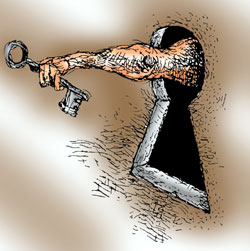 Nepal is on the mend. The Maoist leadership's intention is to give up the bloody 'People's War' and join mainline politics, and they are being engaged by seasoned politicians of the seven-party alliance.
Nepal is on the mend. The Maoist leadership's intention is to give up the bloody 'People's War' and join mainline politics, and they are being engaged by seasoned politicians of the seven-party alliance.
True, the polemics emanating from the Maoist camp have caused concern, and resolution on some matters has been delayed by irresponsible references to an 'October Revolution' and attempts to create fait accompli on issues that should be left to the people's will. Also true is that any slippage would weaken pluralism, democracy, and transparency, for one outcome of the Maoist-SPA negotiations should be that the public gets more, and not fewer, rights and privileges than contained in the 1990 Constitution.
While it's possible to be sceptical about the Maoist intentions, they are believable precisely because they have tried to grab state power by force and achieved failure. When they saw that it did not work, also in the context of a hostile geopolitical environment, they decided at their August 2005 plenum meeting to engage the political parties. That engagement led to the 'People's Movement,' but was endangered by the ham-handed handling of negotiations that let to the June eight-point agreement (which proposed an unrealistic interim constitution process and was dismissive of parliament).
Fortunately, the current discussions between the Maoists and the political parties are marked by sobriety. Both sides know the only way ahead is through laying down of arms and state restructuring. Today the Maoists are showing flexibility on 'arms management' and the parties are willing to discuss restructuring of the state through the constituent assembly process. Thus we now have a rough date, probably late May, for elections to the assembly.
Ups and downs are part of a peace process, and this one has moved steadily forward, alarmist assessments notwithstanding. Once the political package is in agreement, it will be time for the United Nations peacemaking team under the Secretary General's Personal Representative Ian Martin to start work, providing international watch-dogging and standards for arms management, the CA elections and a referendum, should that be the choice. Fortunately, Martin's team is finally coming together, and it is a fine group of professionals with ground-level knowledge of Nepal and also understanding of international precedents, giving it the political sensibility needed to help steer the country towards lasting peace.
The Maoists need a way to go from being a rebel group to a political party-a member of the eight-party alliance, the EPA. This process will help provide a safe landing not only for the CPN (Maoists) but for Nepali society as a whole. We truly think, as we said, that the country is on the mend.


